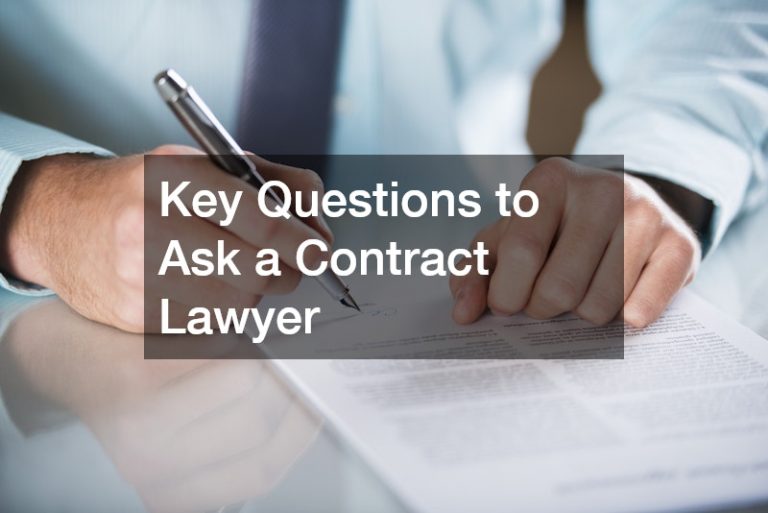Choosing legal counsel for an agreement is easier when you know exactly what to ask. Before you sign, you want clarity on obligations, payment, rights, and remedies, all translated into plain language. A focused conversation helps you avoid vague terms that invite conflict later. By preparing targeted questions, you can leave the meeting with a clear plan and a contract you understand. Asking a contract lawyer the right questions turns a complex document into a practical roadmap.
Scope, Deliverables, and Performance Standards
Start with the heart of the deal. Ask how the contract defines scope, deliverables, and acceptance criteria, and how those pieces will be measured.
Request examples of objective standards, timelines, and documentation you must provide. Confirm who approves milestones, how approvals are recorded, and what happens if a deliverable does not meet the stated requirements. A contract lawyer can point out ambiguous phrasing and replace it with concrete, testable language.
Follow up with questions about change requests. Clarify how new features, extra work, or substitutions are handled, and whether written change orders are mandatory. Ask how price, schedule, and quality are adjusted when scope changes, and who has authority to sign off. If your agreement involves third parties, confirm how their inputs are coordinated and what evidence you need to keep decisions traceable.
Payment Terms and Fee Structure
Money provisions deserve careful attention. Ask whether pricing is fixed, time and materials, or milestone based, and how each model affects risk. Confirm what triggers each payment, what documentation is required with an invoice, and the exact timing for approval and remittance. If there are retainers, holdbacks, or early payment discounts, make sure they are spelled out with numbers, not assumptions.
Probe for the hidden costs that appear after signature. Ask about travel, shipping, licensing fees, and taxes, and who pays them. Clarify late fees, interest, and the right to suspend work for nonpayment, so you know the leverage each side has. If currency or exchange rates may shift, request a clause that addresses conversion, banking charges, and timing to reduce surprises.
Risk Allocation, Liability, and Insurance
Well drafted agreements say who bears which risks. Ask about caps on liability, carve outs for fraud or willful misconduct, and whether consequential, incidental, or lost profit damages are waived. Confirm the warranty period, what remedies are available, and whether exclusive remedies limit other rights. A seasoned contract lawyer can explain how these choices affect negotiation leverage, pricing, and project behavior.
Indemnity language is another priority. Ask who indemnifies whom for third party claims, which categories of loss are covered, and what procedures apply when a claim is made. Verify insurance requirements, such as general liability, professional liability, cyber coverage, and workers’ compensation, and ask for sample certificates. Confirm notice timelines, cooperation duties, and whether you can be added as an additional insured.
Dispute Resolution, Governing Law, and Termination
Disputes are easier to manage when the rules are set in advance. Ask whether disagreements must go to mediation or arbitration, whether litigation is allowed, and where proceedings will occur. Clarify the governing law, the chosen venue, and whether either party can seek emergency relief. If the contract uses arbitration, ask about the forum, discovery limits, and appeal rights, so you understand speed, cost, and confidentiality tradeoffs.
Termination clauses decide how the relationship ends. Ask about termination for cause, cure periods, and specific breaches that permit an exit. Confirm whether termination for convenience is allowed, what fees or wind down costs apply, and how property, data, or work in progress will be returned. Request a transition plan that covers cooperation, knowledge transfer, and the format of final deliverables, so day one after termination is orderly instead of chaotic.
Intellectual Property, Confidentiality, and Data
Ownership and usage rights should be crystal clear. Ask who owns preexisting materials, who owns new work product, and what licenses each side receives. Confirm whether the agreement includes a work made for hire clause, and whether moral rights are waived when permitted. If open source or third party components are involved, request a disclosure and a plan for compliance with those licenses.
Protecting sensitive information is just as important. Ask how confidential data is defined, how long confidentiality lasts, and whether exceptions apply to disclosures required by law. Confirm security standards, incident notice timelines, and data return or destruction requirements at the end of the engagement. If personal data is processed, ask about privacy addenda, cross-border transfers, and audit rights that match your regulatory environment.
Great contracts are built on great questions. By digging into scope, payment, risk, disputes, and rights, you convert dense clauses into clear expectations that guide daily work. Bring your priorities, ask for examples, and insist on language that is specific, measurable, and practical. When you walk through these topics with a contract lawyer, you set the tone for a fair relationship, fewer surprises, and a document that supports results rather than disputes.



